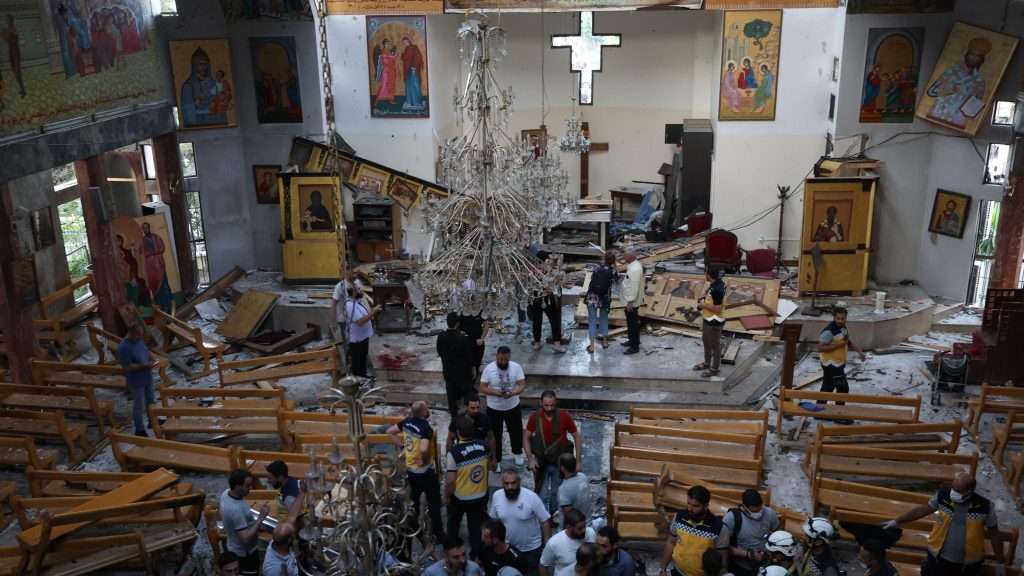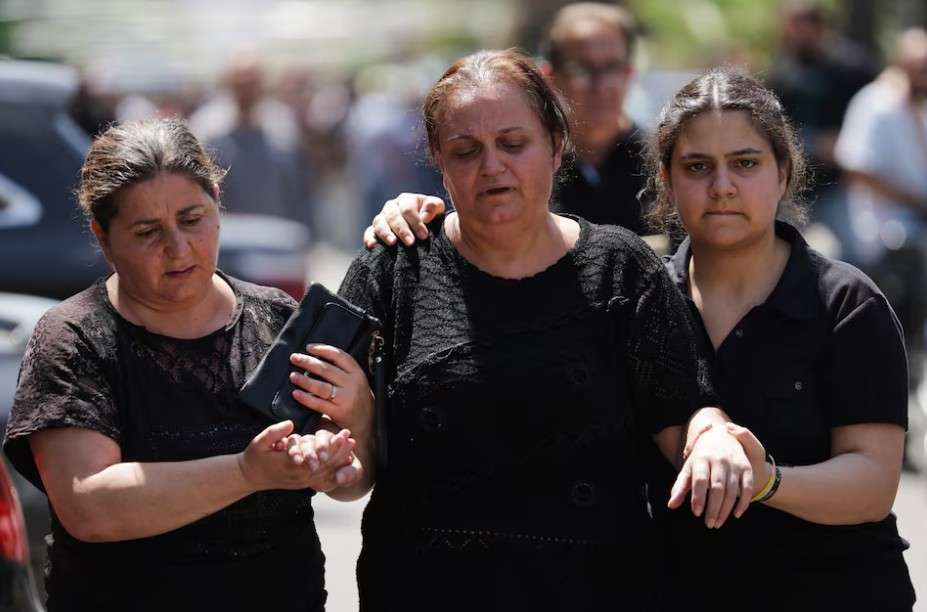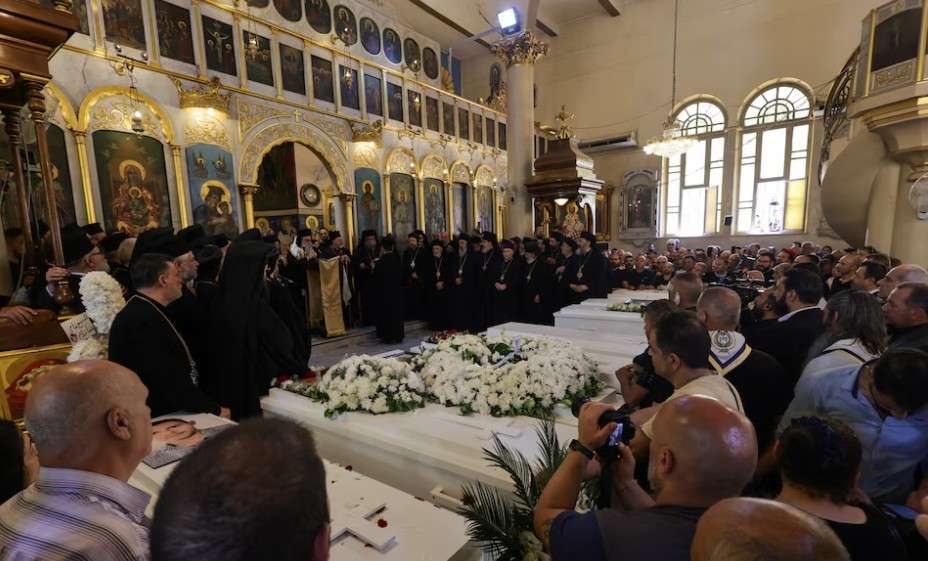Syria’s church bombing shakes trust in new government

Has Syria’s new government already lost the Christians? The bombing at St. Elias church in Damascus wasn’t just an act of terror; it was a reckoning. Is this the failure of a fragile new order, or the quiet collapse of a contract that never truly included them? As churches get empty, what remains of Syria’s promise to its most vulnerable?
The blast shook the city before the bells could. It was notably one of the deadliest suicide attacks in Syria’s recent memory. The bombing at Saint Elias Church on June 22nd killed at least 25 worshippers and wounded 63 more, striking at the heart of a Christian community already riddled with anxiety about its place in a country reeling from over a decade of war. The attack was allegedly conducted by an Islamic State operative, raising grave worries about rising sectarianism.
The transitional government issued a terse statement condemning the attack. They emphasised the need for unity within Syria: “we extend our deepest condolences and sincere sympathy to the families of those who perished in this criminal bombing that affected the entire Syrian people.”
Syria’s foreign ministry described the attack as “a desperate attempt to undermine national coexistence and to destabilise the country”.
But many Christians responded not with with fury. The bombing did not occur in isolation. It exposed the hollowness of Syria’s post-war promise, a fragile calm shattered in a single blaze. One Christian leader, John (X) Yazigi, the Greek Orthodox Patriarch of Antioch, publicly rebuked the transitional president of Syria, Ahmed al-Sharaa, accusing him of failing to protect the very citizens who once placed faith in the secular guarantees of the state.
Security forces deployed hastily to Christian districts in Damascus, but fear already saturated the air. Parishioners avoided liturgies, schools closed early, and church leaders cancelled evening masses. Among Syrian Christians, outrage mixes with despair.
That fear extends beyond physical safety. It reflects a growing belief that Syria’s new rulers either cannot, or will not, protect minority communities. The transition has left religious minorities dangerously exposed, with no credible system of accountability or preventative security in place.
This bombing, for many, marked the end of a post-war illusion. It stripped away the idea that Syria’s transitional government represents a step forward. Instead, it suggested that the most vulnerable may now be facing the same dangers they thought would die with the Assad era, only now without even the pretext of protection.
Fury
The bombing ignited fury not only in churches but across broader civil society. In interviews following the attack, Christian leaders accused the transitional authorities of silence, inaction, and betrayal.
I no longer want to stay here. I want to leave because death has encircled us from all sides
Ordinary Christians echoed the sentiment. Speaking to Al-Monitor, Jenny al-Haddad said: “I no longer want to stay here. I want to leave because death has encircled us from all sides.” With no arrests and no investigation results announced, many in the community described the government’s response as performative at best.
The Atlantic Council characterised the episode as a test of the transitional government’s legitimacy, which it failed. The bombing highlights just how brittle the state’s authority remains, especially in neighbourhoods where militias and informal networks now often provide more reliable protection than police.

In the absence of action, fear calcifies. Many Christian families have begun preparing to emigrate, again. Since the civil war began in 2011, the number of Christians in Syria has gone down from one million to 300,000. “We are very anxious. People’s faces are pale with fear,” said a Christian teacher, who used the pseudonym Heba. A Syrian resident, known as Gabriel, said: “I’m not reassured about my future and I don’t dare get married and have children in this place… a decade ago I had the chance to migrate to Canada, but I gambled that the situation would improve. Today I regret not making use of that opportunity.”
The anxiety extends beyond the Christian community. Alawite communities, once central to Bashar al-Assad’s power base, also report growing fears of retaliation and abandonment, especially after a recent string of attacks in Latakia and the Homs countryside. Minority groups who once operated under the assumption of elite protection now face vulnerability in an increasingly ungoverned Syria.
What happened on Sunday in the church confirms the presence of sectarianism
Despite this shared insecurity, the government has made few public commitments to a minority protection framework. Proposals for constitutional safeguards, long promised by transitional spokespeople, remain vague. Without these protections, sectarian mistrust threatens to unravel the fragile social fabric that remains after years of war. Sidra, a young Syrian Christian says: “If safety is not ensured, Christian in Syria may rise against this government… what happened on Sunday in the church confirms the presence of sectarianism.” He added: “Such acts make us wonder if we need to leave Syria one day.”
For Syria’s Christians, the silence feels familiar. Today, they say they are being left alone to count their dead.
Silence
Christian clergy now shoulder responsibilities that extend far beyond the spiritual. In Damascus and Hama, priests have begun coordinating informal security arrangements, organising first aid drives, and serving as de facto crisis managers in the absence of state protection. A Syrian priest stated: “people are now telling us, ‘Father, we don’t want aid, we don’t want food, medicine, nothing. Help us escape. We can’t live here. We are afraid for our lives; we are afraid for the future of our children.’”
Church leaders who once called for patience with the transitional government now question whether such patience only enabled inaction. Some bishops have demanded an international investigation into the bombing, arguing that Syria’s justice system, still in disrepair after the Assad era, lacks both the capacity and will to act effectively.
What we went through can only have meaning if it ensures this never happens again
That institutional paralysis mirrors a broader struggle across post-war Syria. As The New Arab reported on June 26th, even survivors of regime torture still struggle to access any form of legal support or care. Showcasing a state mainly in disarray. “What we went through can only have meaning if it ensures this never happens again,” a survivor said.
Among Syria’s Christians, this lack of justice fuels cynicism. “Nothing is harder than living in a place where you do not feel safe. I no longer want to stay here,” said Jenny al-Haddad after her father died in the church bombing. Many now believe the state will never hold anyone accountable, neither for past crimes nor for present terror.
The bombing’s timing also deepened suspicion. It came as churches resumed community programmes, encouraged by months of relative calm. In the wake of the attack, whispers of conspiracy have spread. Some claim the bombing reminded Christians of their dependency on government protection. Others believe the attack revealed how little that protection now means. Either way, trust has frayed.
Meanwhile, transitional officials continue to promote narratives of national unity, but offer no meaningful policy shift. Their silence, many Christians say, speaks louder than their slogans. In the absence of credible security or legal guarantees, Syria’s Christian communities now interpret that silence as abandonment dressed in diplomacy.
When you don’t feel safe in your belief or your ritual practices, you are a fourth-class citizen

Exile
The fear now stretches beyond bullets and bombs. In homes across Aleppo, Homs, and Damascus, Christian families quietly prepare contingency plans. Children learn English instead of Aramaic. Suitcases remain half-packed by doorways. “Today, you can no longer protect yourself or feel safe when entering a church,” Nebras Yusef said. He added, “when you don’t feel safe in your belief or your ritual practices, you are a fourth-class citizen.”
For many, survival requires exile. Emigration once symbolised surrender; today, it represents autonomy. The slow but steady departure of Christian families mirrors the broader deterioration of state services, security, and hope. For instance, over 16 million Syrians now face food insecurity, placing additional pressure on minority communities that are already marginalised.
Inside churches, the rituals continue. Incense still rises. Bells still ring. But the pews grow emptier with each passing month. Some priests now record sermons for diaspora congregations, their audiences scattered across Berlin, Beirut, and Montreal. This digital transition underscores what many fear: that Syrian Christianity, once rooted in land and liturgy, now survives mostly in exile.
But the line between defiance and resignation has blurred. For Syrian Christians, the transitional government offered a brief glimpse of something different, perhaps even something just. That vision now seems to be deteriorating.
Atlantic Council, Reuters, Al-Monitor, AFP, The Arab Weekly plus agencies, Deutsche Welle, ACN International, The New Arab
Want to chase the pulse of North Africa?
Subscribe to receive our FREE weekly PDF magazine













